Automotive repair shops have a duty to ensure that waste oil, grease, antifreeze, and other fluids do not contaminate the environment. The Clean Water Act, governed by the Environmental Protection Agency, began shaping the laws pertaining to proper waste oil disposal in bodies of water more than 60 years ago. The EPA has clear specifications and standards regarding regulations for proper waste fluid and oil disposal with which automotive shops have to comply.
The Past Versus the Present
In the past, auto repair shops were able to use a waste oil disposal well to dispose of used oil, grease, and other materials into the ground; however, regulatory agencies identified that this type of waste oil disposal well posed a threat to ground drinking water resources. More than 86% of all U.S. households depend on groundwater for access to fresh, clean drinking water. As a result, repair shops had to change their means of disposal including the use of water to clean floors via floor drains.
Fines for Violations
Improper disposal of waste materials from changing oil, wheel bearings, transmission fluid, or coolant will result in stiff penalties from the EPA as well as from state regulatory agencies. The EPA provides guidelines and requires states to oversee proper waste material disposal from automotive shops. Although each state may impose stiff penalties for any violation, auto repair shops located in aquifer recharge zones are subject to additional regulations due to the threat they may pose to groundwater resources. Every violation for improper disposal of waste materials can incur a fine of as much as $16,000 per day. When a business knowingly violates the statutes regarding the proper disposal of waste materials, the action becomes a criminal violation, which may include a fine of up to $250,000 and 15 years imprisonment.
Find Out About Your State’s Requirements
Since each state has its own disposal regulations, which must meet EPA minimum standards, you will need to check with the governing authority in your state. You can find a complete directory of state regulatory agencies and contact information through the EPA publication: “How the New Motor Vehicle Waste Disposal Well Rule Affects Your Business.”
Oil Recycling
To comply with many of the new regulations, most states have implemented recycling measures regarding waste materials from auto repair shops. In most cases, you will need to store fluids in separate, waterproof containers until they can be transported to a recycling center. Each state further regulates how many gallons of waste material may be transported with or without a permit, so you will still need to check with your state-governing agency.
We all have a responsibility to protect the environment. As an auto tech or auto repair shop business owner, you need to be aware of how environmental regulations impact you. By ensuring you dispose of waste materials, like used oil, grease, and other fluids, properly, you will be able to continue working on wheel assemblies, replacing fluids per vehicle standards, and making other repairs without fearing the decimation of stiff penalties.

